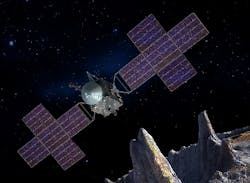LGS Innovations contracted to provide laser communications for NASA Psyche mission
LGS Innovations (Herndon, VA), provider of specialized mission-critical communication research and solutions, was awarded a contract to support the NASA Deep Space Optical Communications (DSOC) Project Laser Transmitter Assembly (LTA). The DSOC instrument will be flown on NASA's Psyche Discover Class Mission as a technology demonstration and will be capable of transmitting engineering and science data from the Psyche Spacecraft in parallel with the Spacecraft’s existing X-band telecommunications system. LGS Innovations will deliver the first laser transmitter to support deep-space, high-bandwidth requirements.
RELATED ARTICLE: NASA says "photonics dawning as the communications light"
Future deep-space exploration missions, both manned and unmanned, will require high-bandwidth communications links to ground stations on Earth to support advanced scientific instruments, high-definition video, and high-resolution imagery. LGS Innovations' next-generation laser transmitter will enable faster communications, driving the efficiency of this and future solar system exploration missions.
The NASA Psyche mission, led by Arizona State University (Tempe, AZ), is a three-and-a-half-year journey set to explore the building blocks of planets, including Earth, by examining a rare nickel-iron asteroid orbiting the Sun between Mars and Jupiter that is thought to be an exposed planetary core. It is expected to launch in 2022 and arrive at Psyche in 2026 for a 21-month observation period in orbit.
"This is a unique project of many firsts. We are honored to support the NASA DSOC's goal to increase communications performance and data transmission rates by many times over conventional means, in a very small form factor," said Kevin Kelly, CEO of LGS Innovations. "The unprecedented high-bandwidth communications links will enable a wider range of future scientific inquiry than is currently possible, as well as improved human communications back to Earth."
LGS Innovations employs more than 1200 associates around the world, including 750 scientists and engineers.
SOURCE: LGS Innovations via Business Wire; https://www.businesswire.com/news/home/20180103005176/en/LGS-Innovations-%E2%80%9CLights-Up%E2%80%9D-NASA-Psyche-Mission

Gail Overton | Senior Editor (2004-2020)
Gail has more than 30 years of engineering, marketing, product management, and editorial experience in the photonics and optical communications industry. Before joining the staff at Laser Focus World in 2004, she held many product management and product marketing roles in the fiber-optics industry, most notably at Hughes (El Segundo, CA), GTE Labs (Waltham, MA), Corning (Corning, NY), Photon Kinetics (Beaverton, OR), and Newport Corporation (Irvine, CA). During her marketing career, Gail published articles in WDM Solutions and Sensors magazine and traveled internationally to conduct product and sales training. Gail received her BS degree in physics, with an emphasis in optics, from San Diego State University in San Diego, CA in May 1986.
